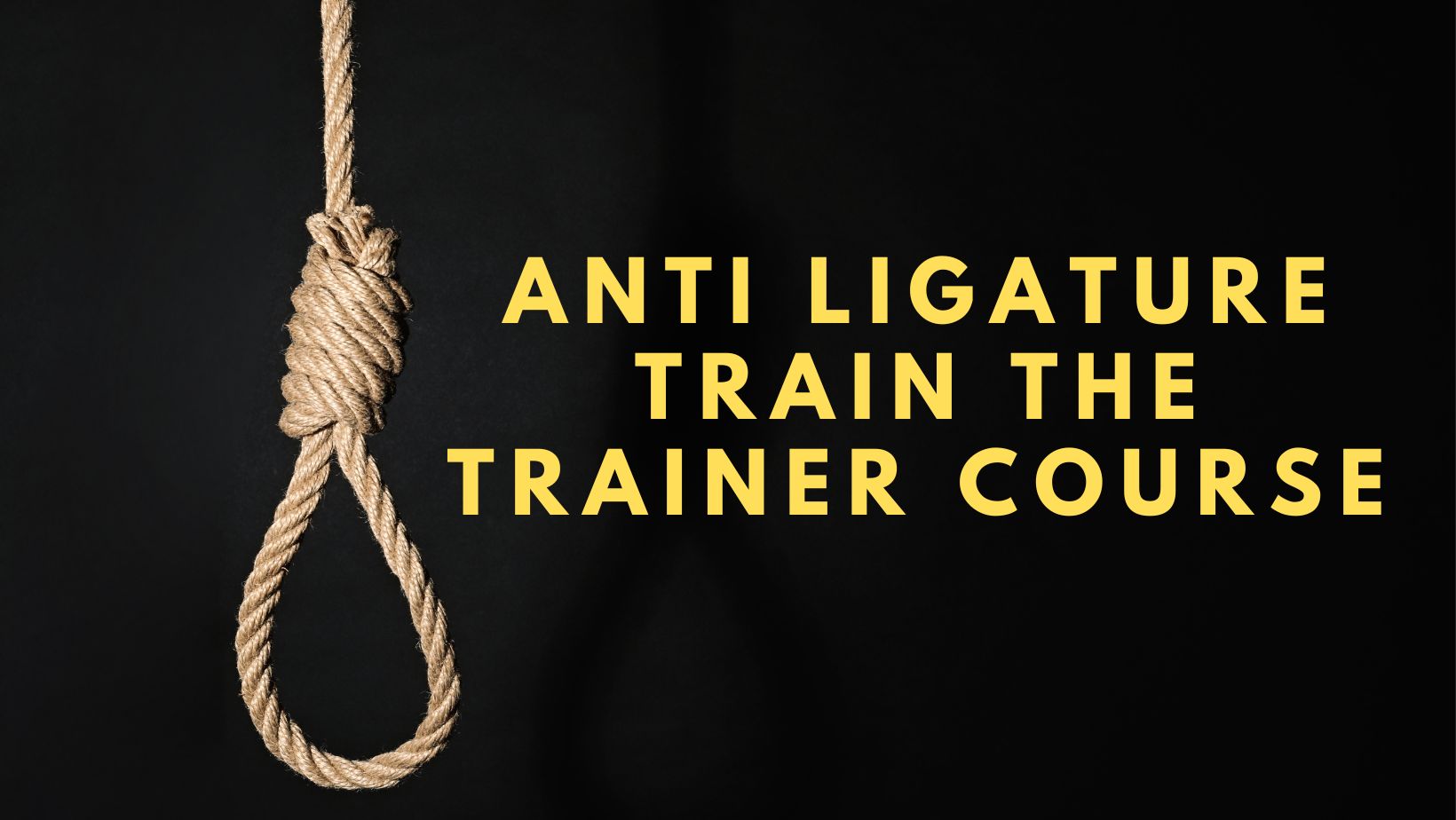Next Course Dates:
11th September 2024
1 x Payment of £599 + Vat
3 x Payments of £200 + Vat
Welcome to our anti ligature training page, where we provide comprehensive training to healthcare professionals, security operators, teachers, social workers, parents, architects, and contractors (to name a few) on the dangers of ligature points and how to prevent them.
What is Anti Ligature Training?
Anti ligature training educates staff on how to identify and eliminate ligature points, which are potential suicide hazards, in mental health units, hospitals, and other healthcare environments.
The training covers everything from identifying ligature points and implementing strategies to reduce the risk of self-harm to understanding the importance of proper documentation.
Why is Anti Ligature Training Important?
You may have recently seen the Channel 4 Dispatches programme ‘Hospital Undercover: Are Our Wards Safe?‘ where a Dispatches reporter went undercover in Essex Partnership University Trust, you would have seen the numerous attempts at patients trying to kill themselves using ligatures.
But it’s far more common than that.
A mental health trust has been fined £1.5m for safety failings over the deaths of 11 patients
The Health and Safety Executive (HSE) took action was taken against the NHS North Essex Partnership Trust (which merged with South Essex Partnership Trust in 2017 to form the Essex Partnership University NHS Foundation Trust) after the deaths by suicide between 2004 and 2015.
The prosecution said the existence of “fixed potential ligature points” amounted to breaches of safety laws.
The judge in the case stated: “There’s no doubt the failures to remove ligature points were a significant cause in the deaths of 11 people who died during the relevant time period, and of a 12th person who died just after, and a number of near misses.
HSE Enforcement Notice against NHS Orkney
The Growing Concern
Suicide by hanging is one of the most commonly used suicide methods with a high mortality rate, with one research study suggesting at least a 70 percent success rate for death.
In England, there are around 2000 hanging suicides per year and it is the most commonly used suicide method.
Many of these attempts leave the victim with life changing disabilities.
This is why this course is so important.
This is why NFPS Ltd has endorsed this Ligature Train The Trainer Course.
Witnessing The Death of A Young Man
In the week that Mark Dawes left the Prison Service, a young man committed suicide in his cell.
He had tied one end of a ligature around his neck and the other onto the cell bars of his window.
When he was found by staff he was already dead.
When the alarm bell was raised Mark was only a few yards away from this particular unit and he attended immediately.
Mark was the first officer on scene, after the two young officers who had found him.
As you can well imagine, both of these lads were in a state of shock.
Almost immediately other staff arrived, so Mark quickly ushered the two officers away from the scene.
Mark’s concern was for them.
Sadly nothing could be done for the young lad who had killed himself, in spite of the valiant attempts by staff to revive him.
When the air ambulance arrived he was too far gone to revive, and the sight of a young life wasted in this manner, coupled with the indignity of his lying there, stripped naked while paramedics inserted tubes into him, was a very sad one.
When the two officers concerned had eventually regained some of their composure, anger started to set in.
They had been warning management for some time about the risks on their wing.
They were short staffed and the inmate population was rising.
They were also very concerned.
Had they done everything they could, and did they miss something earlier on in the day?
These were the questions now being raised between themselves.
Earlier that morning one of them had been talking to the young lad and he seemed in fine spirits.
Had he failed to read the signs?
Hindsight was now becoming a torturer.
A day after the incident everyone who was involved was called to a meeting in the boardroom to discuss the situation and its effect on those staff who attended.
The anger and sadness was all too evident in Mark’s colleagues.
One very senior principal officer who attended broke down and cried.
It’s been many years since that young person took his own life, yet Mark can still remember it in full detail.
NFPS Endorsed Ligature Train The Trainer Training
This is why NFPS Ltd has endorsed this Ligature Train The Trainer Training Course that is being run on the 6th September by James Morris at Lilleshall National Sports Centre, in Ford Hall.
James, like Mark, has had to deal with young people who have tried to take their own lives this way.
Rab, between the ages 4 to 19, grew up with many foster brothers and sisters and has also witnessed several attempts at suicide using ligatures.
Trevel, within his own policing background, is sadly no stranger to this also.
The Benefits of Anti Ligature Training
By eliminating ligature points, healthcare, care and custodial professionals can focus on providing care to those who need it, without the fear of harm or injury.
Additionally, the training ensures that staff are prepared to deal with any potential incidents that may arise.
Is Anti Ligature Training A Legal Requirement?
In the UK, it is a legal requirement for all organisations to ensure the health, safety and welfare of everyone in the workplace.
The Health and Safety Executive (HSE) has identified the risk of suicide in the workplace as a priority area, and therefore it is essential that staff are adequately trained to prevent these incidents from occurring (as you can see from the Health and Safety Executives (HSE) prosecution and cases mentioned above).
Ligature Training Is An Ofsted and CQC Requirement
And this is also why Ofsted and CQC inspectors are continually requesting providers to evidence that staff are receiving ligature training to ensure that staff are equipped with the necessary skills and training to enable them to manage self-harm/ligature incidents and save lives.
This training program is designed to meet the legal requirements set out by the HSE and the evidence required by Ofsted and CQC which you will need when they inspect you.
Who Delivers The Anti Ligature Training?
Your lead instructor, James Morris, is more than competent to deliver this course.
He has operated in secure units and hostile environments and has over 30 years experience in the residential sector as well as holding recognised teaching qualifications.
James will give you the knowledge, the skills and the confidence to be able deal with any ligature incidents that arise but more importantly support your vulnerable clients when they really need it.
What Does The Ligature Train The Trainer Course Cover?
The course covers:
1): Responsibilities of the first responder
2): How to complete the Primary Survey
3): Different types of ligature cutters
4): How to use ligature cutters
5): Basic life support (first aid)
6): Physical & behavioural signs of ligature use
7): How to preserve a scene and the importance of it
8): How to report an incident and the information to record
9): An overview of what policies, procedures and best practice should be in place
10): Understanding the choking game is and why people do it, including the medical risks & implications and the associated signs
Plus loads more …….
What Do I Get Once Trained As a Ligature Trainer?
On completion of the course you will receive:
1) Certificate of completion, valid for 12 months;
2) All training powerpoint presentations;
3) All Course Plans;
4) All trainer notes;
5) Delegate workbook;
6) Delegate assessment criteria and trainer answer sheet;
7) Two sets of ligature cutters, one set of kevlar gloves.
When Is The Next Ligature Train The Trainer Course?
The date of the next anti ligature train the trainer course will be Thursday 12th September 2023.
If you wish to get notification of the next date after this course, or to book on this one, please enter your details in the form at the bottom of this page.
Your investment in this course includes lunch, hot drinks and refreshments.
If you need accommodation for the evening prior, let us know and we will assist with that.
What Is The Cost of The Anti Ligature Train The Trainer Course?
Your investment in this unique trainer training course is only £599 +VAT. Priced so you can ensure a return on your investment from the very next day.
What Do I Do Next?
To book your place on the next course choose your payment option below and then simply click the ‘Book now’ button to secure your place.


